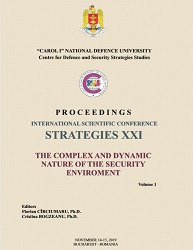THE COLD WAR GENEALOGY OF DONALD TRUMP’S
CRITICISM OF NATO BURDEN-SHARING
THE COLD WAR GENEALOGY OF DONALD TRUMP’S
CRITICISM OF NATO BURDEN-SHARING
Author(s): Alexandru MUNTEANU-LUCINESCU-CASELLA
Subject(s): Economic policy, International relations/trade, Security and defense, Military policy, Electoral systems, Peace and Conflict Studies
Published by: Carol I National Defence University Publishing House
Keywords: Donald Trump; NATO burden-sharing; Cold War; transatlantic relations; United States; defence budget.
Summary/Abstract: Since assuming office, Donald Trump turned the burden-sharing among NATO members into one of the most contentious issues of the transatlantic relations so that his stance became a relevant topic for research and debate. Given that the roots of Trump’s criticism are to be found during the final years of the Cold War when he began to widely publicized his dissatisfaction with the major financial loss for the United States that, in his view, resulted from the defence it provided to its allies around the world, framing his views in the policy towards NATO burden-sharing followed by the United States during the Cold War, which is the purpose of this paper, contributes to further the understanding of his current position on this topic. For this purpose, in the first section of the paper are highlighted and described the two approaches to the NATO burden-sharing developed at the political level in the United States from 1949 to 1989 and the importance that successive presidents of the United States attached to them during that period is considered. In the second part of the paper, these approaches are used for analysing Trump’s influential open letter from 1987 and the widely commented speech he delivered the same year at Portsmouth Rotary Club, which both addressed the financial aspects of the defence by the United States of its allies and which turned him for the first time into a potential presidential candidate. The paper concludes that Trump’s position was not out of the ordinary because it reflected the political debates on NATO burden-sharing that took place in the United States during the Cold War and that a correct understanding of it is highly relevant for his present position on this topic given that he continued to hold the essence of it after the end of the Cold War.
- Page Range: 7-16
- Page Count: 10
- Publication Year: 2019
- Language: English
- Content File-PDF

